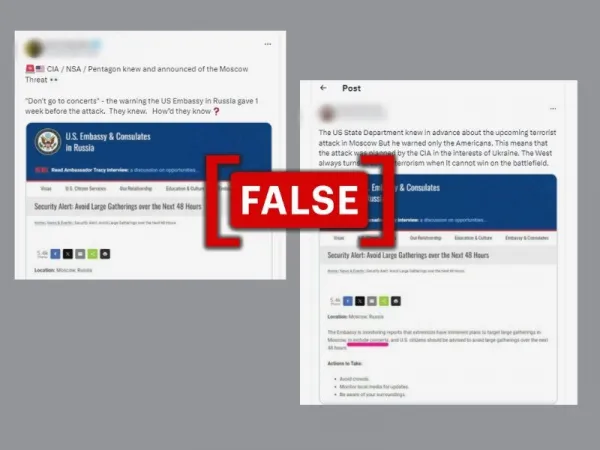By: Emmi Kivi
March 25 2024
 Source: X
Source: X
The warning issued on March 7 was for 48 hours predating the Moscow attack by two weeks; it is not evidence of U.S. involvement in the Moscow attack.
Context
On Friday, March 22, attackers opened fire at the Crocus City Hall in Moscow and set ablaze the fully-packed concert hall in the deadliest attack inside Russia for over two decades. Although much is still to be confirmed about the attack and the attackers, speculation is rife on social media.
Some social media users claim the U.S. knew of the attack in advance. As proof, users shared screenshots of a Security Alert the U.S. Embassy & Consulates in Russia had earlier issued, which advised those in Moscow to avoid large gatherings due to an increased risk of an attack by extremists on large crowds. One user wrote, “CIA / NSA / Pentagon knew and announced of the Moscow Threat. Don’t go to concerts” - the warning the US Embassy in Russia gave 1 week before the attack. They knew. How’d they know?”
Other users purported the early warning as proof of U.S. involvement in the attack itself; “The US State Department knew in advance about the upcoming terrorist attack in Moscow But he warned only the Americans. This means that the attack was planned by the CIA in the interests of Ukraine The West always turns to acts of terrorism when it cannot win on the battlefield.”
However, the warning was issued on March 7 and lasted for the next 48 hours, predating the attack at the concert hall.
In fact
On March 7, the U.S. Embassy & Consulates in Russia published a warning headlined, "Security Alert: Avoid Large Gatherings over the Next 48 Hours” in Moscow, Russia. According to the warning, the Embassy was monitoring reports that “extremists have imminent plans to target large gatherings in Moscow, to include concerts, and U.S. citizens should be advised to avoid large gatherings over the next 48 hours.”
The warning advised caution for 48 hours following the statement, predating the concert hall attack on March 22 by two weeks. It does not prove that the U.S. has prior knowledge of the event or its involvement.
Screenshot of the U.S. security alert, published March 7. (Source: U.S. Embassy & Consulates in Russia website.
Edited by Logically Facts)
The U.S. did not just issue a public warning for American citizens. The White House National Security spokesperson, Adrienne Watson, told Reuters, “The U.S. government also shared this information with Russian authorities in accordance with its longstanding ‘duty to warn’ policy.” Putin stated the warning resembled “outright blackmail and the intention to intimidate and destabilize our society.”
On March 22, National Security Council spokesman John Kirby stated that Washington had no prior knowledge of the attack, saying, “I’m not aware of any advanced knowledge that we had of this,” and remarked that he did not believe the earlier warning was referring to the attack at the concert hall.
Both U.S. and Ukrainian officials have denied claims of Ukraine's involvement in the attack.
The verdict
The security alert does not prove U.S. knowledge or involvement in the Moscow attack. The 48-hour warning was issued on March 7, predating the attack by two weeks. National Security Council spokesman denied claims of Washington having prior knowledge of the attack and its connection to the previous warning. Therefore, we have marked the claim as false.